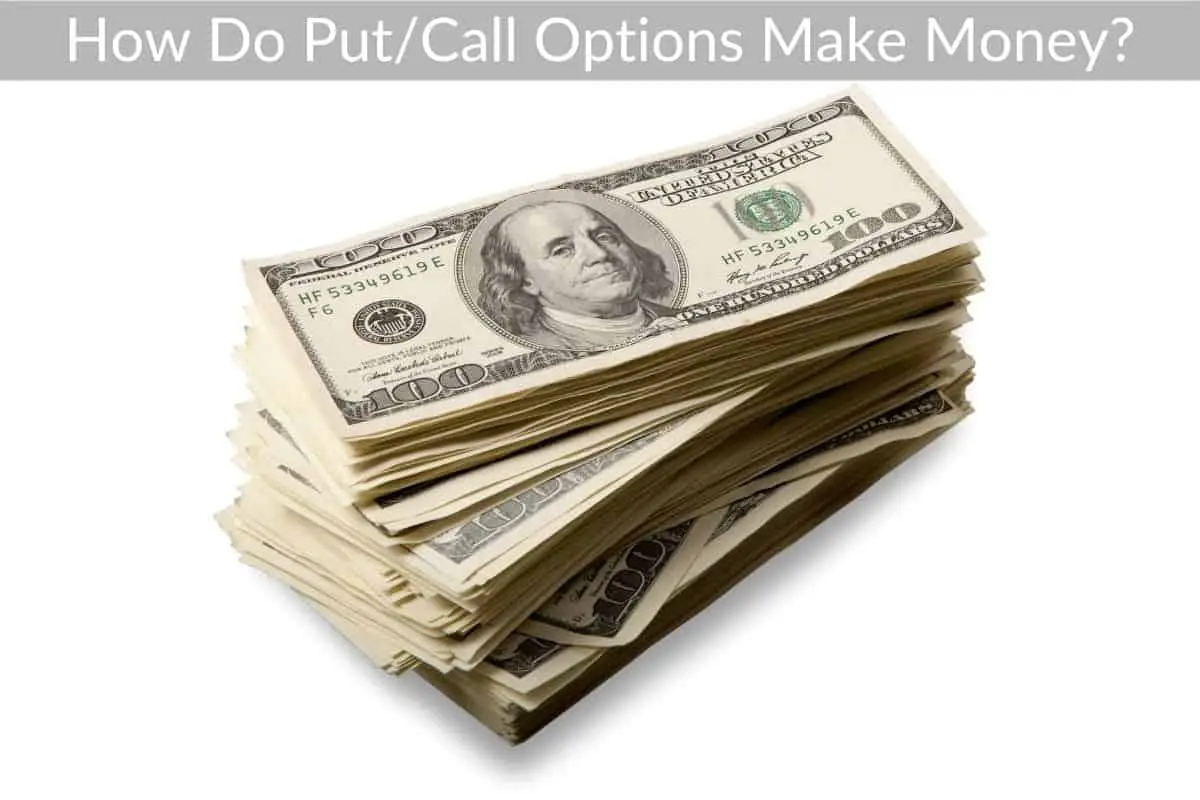Table of Contents
*This post may contain affiliate links. As an Amazon Associate we earn from qualifying purchases.
Options are a vital part of many investors’ portfolios due to their impressive versatility. While most investors generally only trade shares, there are various ways to utilize options to make money.
But before you start using them, it’s crucial to understand how they work.
Put/call options can make money by trading existing contracts. However, you can also choose to write options contracts or exercise them if they’re in the money.
Your calls and puts become worthless if you don’t trade or exercise them before their expiration.
Next, I will dive into the ways calls and puts can make you money. Trading options is certainly more complex than just trading shares. However, it can also be more lucrative.
How Put/Call Options Make Money
Options are a major driving force of the stock market, especially in recent years. These derivative contracts allow owners the right to buy or sell underlying securities at a strike price.
They come primarily in two forms: calls and puts.
The vast majority of traders will make money by trading existing contracts much like you would trade stock:
Buy low, sell high.
Options experience significantly more volatility than stocks. Meaning there’s generally more potential profit and loss in trading them than stocks or ETFs. In fact, the chances of suffering a 100% loss from purchasing options are pretty high.
However, investors can also choose to write options contracts, collecting the premium off selling them. Alternatively, they can also elect to exercise their calls and puts if those contracts are in the money.
Each strategy has its strengths and weaknesses. And depending on the situation, certain choices will be more profitable than others.
Read on to see how trading, exercising, and writing contracts can each make money.
How Trading Options Makes Money
As mentioned above, trading existing options is typically the most popular way investors profit from them. This is because it’s also the most straightforward and accessible strategy.
You more or less trade calls and puts the same way you do shares in a company. If you buy an option at $100 and sell it at $200, you profit from that difference.
However, stocks and options have some differences that are critical to know.
First and foremost, options experience significantly more volatility. This is because they are derivative contracts tied to large quantities of underlying assets and market attitudes.
This volatility is partially what makes them so lucrative. Since the price of some options may often leap or plummet, there’s ample opportunity for profit through trading them.
Also, unlike shares of a company, options expire. If you buy one and don’t sell (or exercise) it before the expiration date, it becomes essentially worthless.
As a result, they derive much of their worth extrinsically through time value. Specifically, an option has more value the farther away that the expiration date is.
How Exercising Options Makes Money
Besides trading options, investors can also choose to exercise them.
So, what exactly does it mean to exercise your contracts? And how does it make you money?
I covered earlier that options are contracts to buy or sell underlying shares. Exercising one call would mean paying for 100 shares at that contract’s strike price.
And if you exercise a call at a strike price below the share price, you profit from doing so.
Here’s an example:
Let’s say a call’s strike price is $1. But the stock is currently worth $2. Exercising that contract means you can essentially buy 100 shares of that stock at 50% of its current cost.
The opposite is true for puts. If the strike price is $1, but the stock is $0.50, then you can exercise and sell the underlying shares at double their market value and thus collect the difference.
Whether or not you should exercise options depends on if they’re in the money or out of the money and also your investment objectives. Most option traders simply buy and sell the contracts and never actually exercise them.
What “In The Money” And “Out Of The Money” Mean
When discussing options, you’ll often hear them described as either in the money (ITM) or out of the money (OTM).
Options that are in the money have a profitable position relative to their strike price.
Out of the money is the opposite of this. It’s when a contract’s position provides no additional value from being exercised.
Using the earlier example, a call with a strike price of $1 would be ITM if the corresponding share price is above $1 (whether it’s $1.01 or $100). Conversely, a put with a strike price of $1 would be ITM if the underlying stock’s price is $0.99 or less.
If a contract expires OTM, it becomes worthless. However, ITM contracts can and should be exercised before they expire.
Many brokers will even automatically exercise or sell your ITM options at expiry for you. Assuming your account can cover doing so. Otherwise, you’d essentially be burning free money.
Something less common you might see is options that are at the money (ATM). ATM means the contract’s strike price precisely matches the stock’s market price. In these cases, calls and puts can still hold worth due to their time value.
How Writing Options Makes Money
Some investors opt to be what are known as options sellers.
The name is a little misleading, as this isn’t someone who just sells existing contracts. Instead, they’re investors who write calls and puts to sell to the market.
Writing options can be profitable, but not in the same way trading existing contracts is.
Essentially, options writers hold a position opposite of options buyers. While a buyer profits from a call’s underlying stock staying above the strike price, the writer profits from the opposite.
Investors who write options only make money off the premium they get for creating and selling the contract and then the difference in what they paid for the stock and where they sell it at.
You can think of the premium as being more or less the same as an options contract’s market price.
Regardless of if the stock soars or sinks, options seller’s profit is limited to that smaller premium buyers pay plus the difference between what they paid for the stock and sold it for.
Additionally, the loss potential for writing options is pretty high as the stock could drop to zero (although it’s unlikely).
So why do people write options?
Many people write options because despite how it all sounds, the odds are pretty good for option writers. Exact numbers differ, but it’s generally thought the majority of options expire worthless (not including options exercised or closed earlier).
More OTM expirations mean more potential profit for options writers.While writing options can be lucrative, it’s also relatively complicated and potentially risky.
You give up almost all of the upside possibilities (above what the strike price is) and still have a lot of downside risk. The premium that you keep no matter what does help cover some of the downside risks however.
Final Thoughts
When it comes to trading, there isn’t a security that is more flexible than options. These contracts are a powerful and essential tool for investors at all levels.
By understanding how they make money, you’re much better prepared to succeed with them.

